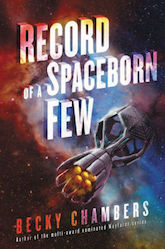This week, I want to gush about Becky Chambers’ Record of a Spaceborn Few.
Becky Chambers writes novels that don’t have plots in the traditional science-fictional sense. We’re used to novels where every explosion is part of a conspiracy, every disaster planned, every death part of someone’s intent. Chambers’ novels apply gentle literary conventions to a science fictional setting: these are novels where character and theme are the most significant parts, and where the characters—richly human, believable, compelling—each in their own way shed light (or highlight) the thematic argument that Chambers conducts.
Record of a Spaceborn Few, Chambers’ third and latest novel, is an argument about change and continuity, community and belonging, and what it means to have (or have to find) a place in the world; what it means when the place you have in the world changes, or when it’s not everything you once thought it might be; and about the tension between the preservation of the past—of tradition and the way things have always been done—and the need to adapt to the present and the future.
Buy the Book


Record of a Spaceborn Few (Wayfarers)
Record of a Spaceborn Few takes place in the human Exodus Fleet, which has in the last few generations come in contact with, and to a degree become part of, the Galactic Commonwealth. The Exodus Fleet left Earth behind a long time ago, and has sustained a way of life alone among the ships in the Fleet—alone in the galaxy. But contact with the other sapient species of the galaxy has brought change. Many young people of the Fleet are leaving it behind for life on planets, and visitors and merchants coming to the Fleet have disrupted the communal barter-and-gift system that formed the bedrock of Exodan exchange. In many ways, the Exodus Fleet is an explicitly utopian society: no one goes hungry or without shelter, everyone’s basic needs are met, people are not required to work—although they do, largely at jobs they find satisfying or personally important. But that doesn’t mean everyone’s happy.
Record of a Spaceborn Few follows several characters in an exploration of their lives among the Exodus Fleet. Tessa, Eyas, Kip, and Isabel are all native Exodans. Tessa is the mother of two young children. Her daughter witnessed a catastrophic accident—the destruction of one of the Exodus Fleet vessels—at an impressionable age, and is terrified of the fragility of her surroundings. Eyas is a caretaker, one of the people who take care of the Exodans’ dead. It’s a job she always wanted, but now she’s finding that people see her job first: she’s rarely able to be just a regular person, and that’s leaving her a little unsatisfied. Kip is a teenager, restless in the Fleet, unsure what he wants from life. Isabel is an archivist, dedicated to preserving—and documenting—memory and history. The heart of the Exodus Fleet, for her, is the archives.
There are two other major characters in Record of Spaceborn Few. Sawyer is a human descended from members of the Exodus Fleet, a young man who comes to the Exodus Fleet because he wants to “try something new.” But he doesn’t fit in, and it leads to an entirely avoidable tragedy. And the alien anthropologist Ghuh’loloan Mok Chutp has come to the Exodus Fleet to observe its inhabitants and their adaptation to the Galactic Commonwealth. A colleague of Isabel in the academic sense, Ghuh’loloan’s observations look at the Exodus Fleet from a complete outsider’s perspective—but a different perspective to the one the reader brings.
Like Chambers’ previous novels, Record of a Spaceborn Few is a quiet, almost domestic work, underlain with a deep compassion and a feeling for community. The community of the Exodus Fleet is a character here, as much as any of the individuals, and as Chambers explores it from different angles the reader becomes aware that this is a meditation of sorts on the point of communities: on how they change, and on the people who live in them.
I deeply appreciate Chambers’ science fiction, and I really enjoyed this novel. Quiet, kind, character-driven books are wonderfully restful. Delightfully soothing.
What are you guys reading lately?
Liz Bourke is a cranky queer person who reads books. She holds a Ph.D in Classics from Trinity College, Dublin. Her first book, Sleeping With Monsters, a collection of reviews and criticism, was published in 2017 by Aqueduct Press. It’s a Locus Award finalist as well as nominated for a Hugo Award in Best Related Work. Find her at her blog, where she’s been known to talk about even more books thanks to her Patreon supporters. Or find her at her Twitter. She supports the work of the Irish Refugee Council and the Abortion Rights Campaign.










